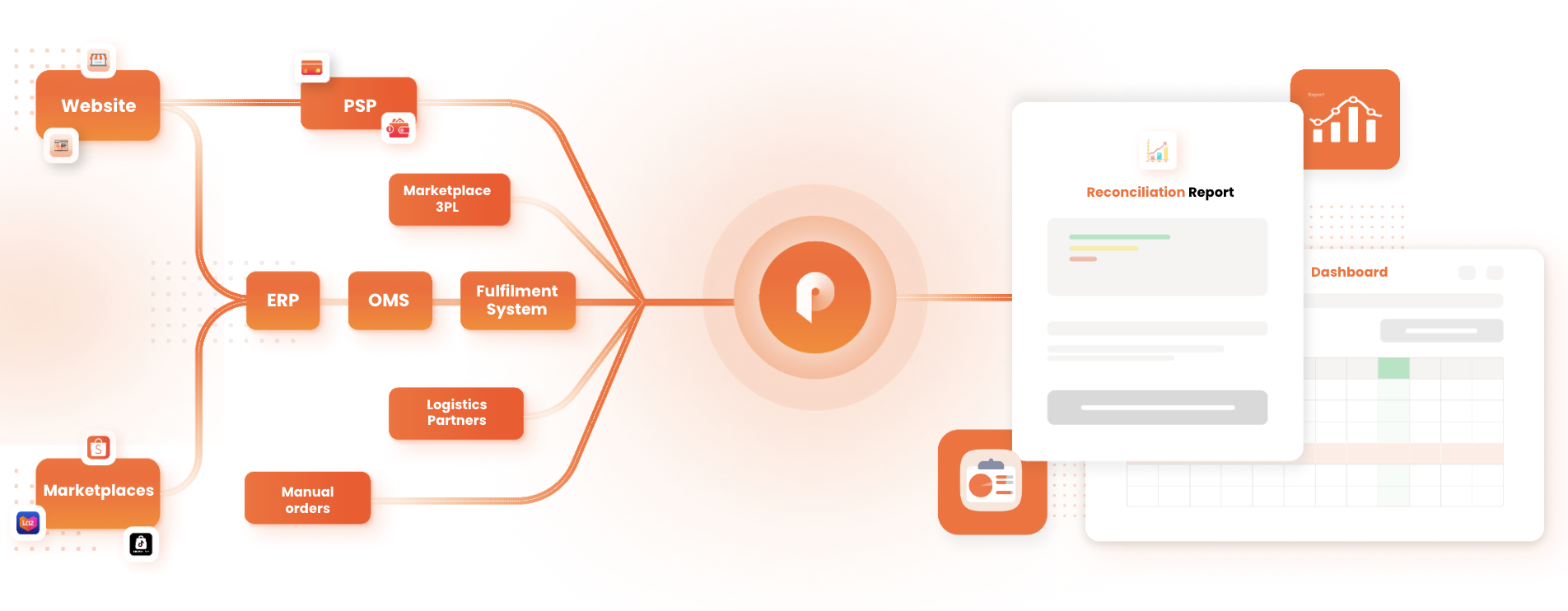Overview
Comprehensive Overview of Our Reconciliation Feature
In today’s fast-paced financial world, businesses handle a lot of financial transactions, and keeping these records accurate is critical. Our Reconciliation Feature makes this easy by automatically comparing transaction records from your system with data from payment providers, marketplaces, and other platforms. This helps businesses quickly spot and fix differences, saving time and reducing errors.
The feature checks and compares transactions from different data sources, finding differences such as missing transactions, incorrect amounts, wrong fees, or other mismatches. Whether your business deals with a huge number of transactions or complex operations across multiple platforms, our tool gives you the insights needed to fix discrepancies and keep your financial records up to date and in line with industry standards.
Core Functionalities
- Automated Reconciliation: It matches your transaction/order data with external sources, so you don’t have to do it manually. This is especially helpful if you handle lots of transactions.
- Discrepancy Detection: It identifies missing or incorrect transactions, wrong fees, or mismatches in amounts. This ensures your financial records are always accurate.
- Customizable Workflows: Every business is different. Our Reconciliation Feature lets you adjust the reconciliation process to fit your business needs. You can customize it to handle different fee structures, commissions, or tax rules to match your needs.
- Real-Time Monitoring: Stay updated on the status of your reconciliation in real-time. This feature helps you monitor ongoing reconciliations, detect issues quickly, and fix them without delays, improving overall financial accuracy.

How It Works
- Data Collection
Our Ingestion tool helps you upload all your transaction data from various sources, like payment gateways, marketplaces, or your internal systems. It ensures:
- Multiple files can be uploaded at once.
- Data errors, like missing or incorrect formats, are flagged and fixed before reconciliation.
- You can track the status of each file in real-time.
- Customized Setup
With the Configuration tool, you can:
- Set up fees, commissions, and taxes based on your business rules.
- Define acceptable error margins for minor mismatches.
- Manage who can make changes, keeping your data secure.
- Viewing Results
The Dashboard is where you see the results of the reconciliation. It allows you to:
- Compare your data with multiple external sources.
- Spot missing or mismatched transactions in amounts, fees, or taxes.
- Use filters to focus on specific dates, regions, or data types.
- Download reports for detailed reviews or audits.
Business Use Cases
E-Commerce Service Providers
Companies offering logistics, order management, or payment settlement services rely on accurate financial tracking to manage operations efficiently.
- Match service charges, commissions, and payments automatically: This ensures that all charges align with actual transactions across platforms.
- Support operations across multiple platforms: Reduces the complexity of managing diverse systems and minimizes manual intervention.
- Ensure timely settlements: Streamlines cash flow by ensuring payments and charges are settled without delays.
Online Retailers
Retailers using multiple marketplaces and payment gateways often face mismatches in their financial data, impacting reporting accuracy.
- Identify mismatches in fees, taxes, and commissions: Highlights inconsistencies across marketplaces and platforms for quick resolution.
- Resolve discrepancies efficiently: Allows for faster corrections, improving financial data reliability.
- Ensure transparency across platforms: Tracks sales and payments, giving retailers a complete and consistent financial picture.
Payment Providers (PSPs)
Handling transactions for numerous merchants demands precision to maintain trust and reduce disputes.
- Verify transaction fees and commissions: Ensures accurate settlements for merchants.
- Highlight missing or mismatched transactions: Quickly identifies issues that could cause delays or disputes.
- Enhance settlement efficiency: Helps PSPs process settlements faster, boosting merchant satisfaction and operational reliability.
Food Delivery Platforms
Platforms managing payouts for restaurants, drivers, and other stakeholders face intricate reconciliation challenges.
- Reconcile fees, delivery charges, and taxes: Ensures all stakeholders are paid accurately and on time.
- Track discrepancies across systems: Identifies mismatched data between order management, payment processors, and financial records.
- Maintain consistent payouts: Builds trust by ensuring all payments align with expected values.
Multi-Channel Merchants
Merchants operating across marketplaces and direct sales channels require a unified view of revenue to avoid financial losses.
- Track revenue across all channels: Consolidates financial data for easier reconciliation.
- Verify fees, commissions, and taxes: Ensures accurate financial tracking for each channel.
- Prevent revenue leakage: Identifies missed or incorrect transactions that could result in lost revenue.
Who Benefits
Finance Teams
Finance teams are responsible for closing books and maintaining accurate records, often under tight deadlines.
- Save time with automation: Eliminates repetitive manual reconciliation tasks, enabling teams to focus on analysis.
- Speed up book closures: Ensures all transactions are reconciled promptly for faster reporting.
- Minimize human error: Reduces risks associated with manual data handling, improving reliability.
Compliance Officers
Compliance officers need to ensure that all financial transactions adhere to regulatory standards to avoid penalties.
- Ensure accurate transaction recording: Provides a complete and traceable transaction history.
- Maintain audit-ready records: Helps businesses stay prepared for audits with detailed, up-to-date reconciliation data.
- Reduce compliance risks: Flags discrepancies early, minimizing regulatory exposure.
Business Owners
Business owners require accurate and timely financial insights to make informed decisions and manage cash flow effectively.
- Build confidence in financial data: Ensures that revenue and expenses are properly reconciled and reliable.
- Support better decision-making: Provides actionable insights to optimize operations and growth strategies.
- Enhance financial planning: Helps forecast and manage cash flow based on accurate transaction data.
Conclusion
Our Reconciliation feature collects your transaction data, matches it with external records, and helps you fix any mismatches. This improves the accuracy of financial operations and gives you more control over your records. Our tool reduces manual work, minimises errors, and keeps your financial data accurate and compliant with industry standards.
Updated 5 months ago
